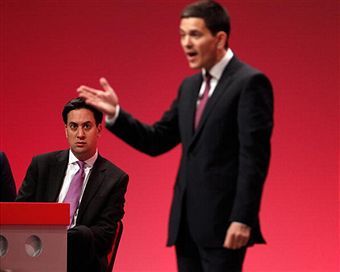 David Miliband’s address to the Labour conference ended as it began: with a
standing ovation. Sentimentality and sympathy, perhaps – but it was also deserved. This was a speech that his younger sibling will be hard pressed to match tomorrow. Indeed, I doubt even
MiliD has matched it himself before now
David Miliband’s address to the Labour conference ended as it began: with a
standing ovation. Sentimentality and sympathy, perhaps – but it was also deserved. This was a speech that his younger sibling will be hard pressed to match tomorrow. Indeed, I doubt even
MiliD has matched it himself before now
It began, of course, with an attempt to massage out the tensions of the past few days. There were some gags about how Miliband had draft speeches for Saturday and Tuesday on his computer – “so I’ve got a couple of speeches to draw on.” And he implored Labour to unite behind his brother – “we have a great new leader and we’ve got to get behind him.” He added, by way of a fraternal backslap, “I’m incredibly proud of my brother”. So far, so smooth.
From there, though, Miliband segued into what was the most impressive part of the speech. “We need to come out of this conference united,” he said, “and nowhere is that more important than in the war in Afghanistan.” What followed was an impassioned tribute to our troops, and a full-throated defence of their operation against the Taleban. “We are not an occupying army, we are trying to prevent an occupation,” he added, before calling for a “political settlement” to the crisis.
There was even a dash of cross-party bonhomie, as Miliband said of David Cameron, “when he takes risks for peace, we will be the first to congratulate him every step of the way.”
Miliband did weave some dividing lines, though; the most significant of which was his call for a more humanitarian foreign policy. This was a two-step shuffle: first, it involved caricaturing the coalition’s policy as one focussed only on trade, and then it demanded more vocal action in places such as Burma, Sri Lanka and the Middle East. Miliband’s definition for this was “hardheaded internationalism”. It delivered, he claimed, the independent Republic of Kosovo in place of “slaughter” in Eastern Europe.
Then, to the conclusion, where the cuttings from his leadership speech made their most prominent appearance. He quoted J.R. Clynes to the effect that, “we come into politics not to practice class war, but to end it.” Yes, this was a speech designed to draw a line under Labour’s own internal war. But it may have left the audience wishing that this Miliband brother – or, indeed, this hitherto unseen version of David Miliband – had been elected party leader.






Comments